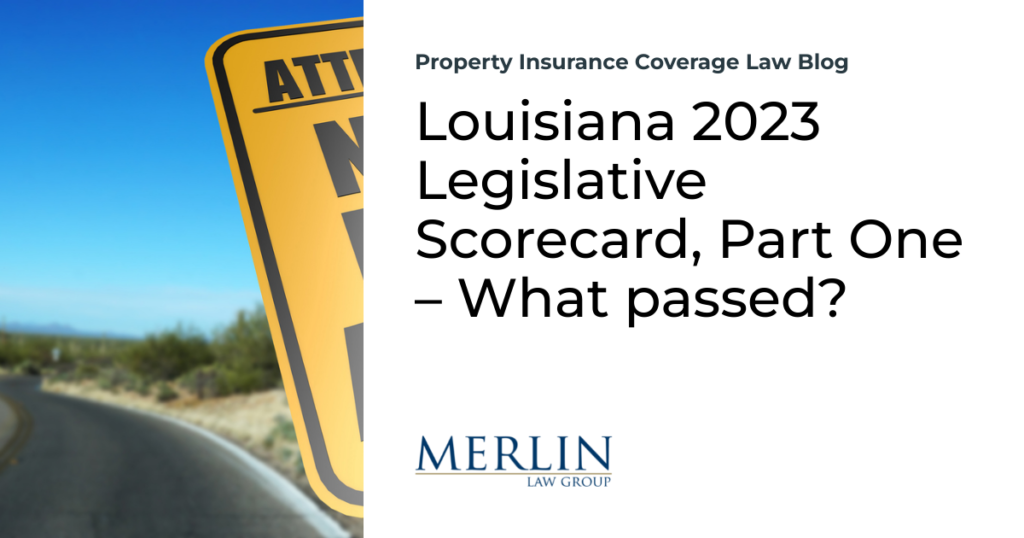Louisiana 2023 Legislative Scorecard, Part One – What passed?

Louisiana recently completed its 2023 legislative session. As expected, the most recent session was very busy, especially in the area of property insurance legislation. Facing a dwindling and increasingly expensive insurance market and recent reforms in Florida, Louisiana was confronted with numerous bills attempting to address the perceived problems in its insurance market.
The Fortify Homes program received a lot of attention during this legislative session. The major property insurance bills per the Louisiana House legislative services report:
HB 294 and HB 309 Require insurance companies to provide discounts for individuals who build or retrofit their homes or businesses using certain fortified home or commercial standards.
SB 113 and HB 309 Remove a restriction limiting discounts for fortified construction to single family homes, thereby expanding access to the discount to all insurable residential and commercial property
HB 110 Requires an insurer to offer an endorsement to upgrade a non-fortified roof to comply with fortified standards when the roof is already damaged and undergoing replacement.
In a press conference following the legislative session, Commissioner Jim Donelon and Rep. Mike Huval stated that the most important long-term fix to the property insurance market is strengthening the Louisiana building codes and providing incentives, including a $10,000 grant for property owners to build and update their property to the Fortify Homes standards.
According to proponents of the bills, these initiatives will assist in protecting properties from severe storms. Fortify Homes has been a legislative project for multiple years, but this year the Legislature allocated budget funds for grants, similar to what Alabama has done with its Fortify Homes program. Commissioner Donelon stated his hope that Louisiana achieves similar success. All of the Fortify Homes bills passed unanimously or near unanimously.
HB 183 Prohibits agreements between an insurance consumer and a third party that would transfer benefits for a property insurance loss to the third party as payment for services.
HB 183 is a ban on assignment of benefits that was passed in reaction to legislation in other states as well as the ongoing controversy involving McClenney Moseley and their improper use of assignment of benefits contracts. This bill passed nearly unanimously.
SB 156 Prohibits an insurance company from including policy provisions to restrict a consumer’s right to hire a public adjuster for property insurance claims.
SB 156 was a reaction to the increasing number of insurance companies offering or requiring endorsements on policies that include bans on policyholders hiring public adjusters. Notably, this law does not apply to surplus lines carriers. The bill passed unanimously.
SB 106 Requires the insurer to provide the insured claim file upon written request:
Relative to first-party property damage claims, policyholders shall have the right to request and receive from the insurance company any portion of the claim file, including but not limited to any written reports, estimates, bids, plans, measurements, drawings, engineer reports, contractor reports, statements, photographs, video recordings, or any other documents or communications unless the record that the insurance company prepared or used during its adjustment of the policyholder’s claim is legally privileged in accordance with R.S. 22:1964(14). An insurance company may keep confidential adjuster notes, logs, and any other documents or communications prepared in conjunction with a fraud investigation in accordance with R.S. 22:1964(14).
This bill passed unanimously as a common-sense measure to clarify that insurers must turn over the entire claim file upon written request.
Finally, SB 96 provides that Louisiana Insurance Guaranty Association and Louisiana Citizens Property Insurance Company are not liable for bad faith penalties under LA R.S. 22:1892 from class action lawsuits and are immune from the penalty for 200% of consequential damages contained in LA R.S. 22:1973. This bill will be the subject of a future blog post discussing the twists and turns as to how it was passed. In short, the final language was quite different than the original language, and, as many attorneys discussing this bill have read the law, Louisiana Citizens is still liable for bad faith penalties, reasonable attorney’s fees, and costs under LA R.S. 22:1892, the main Louisiana bad faith statute.







